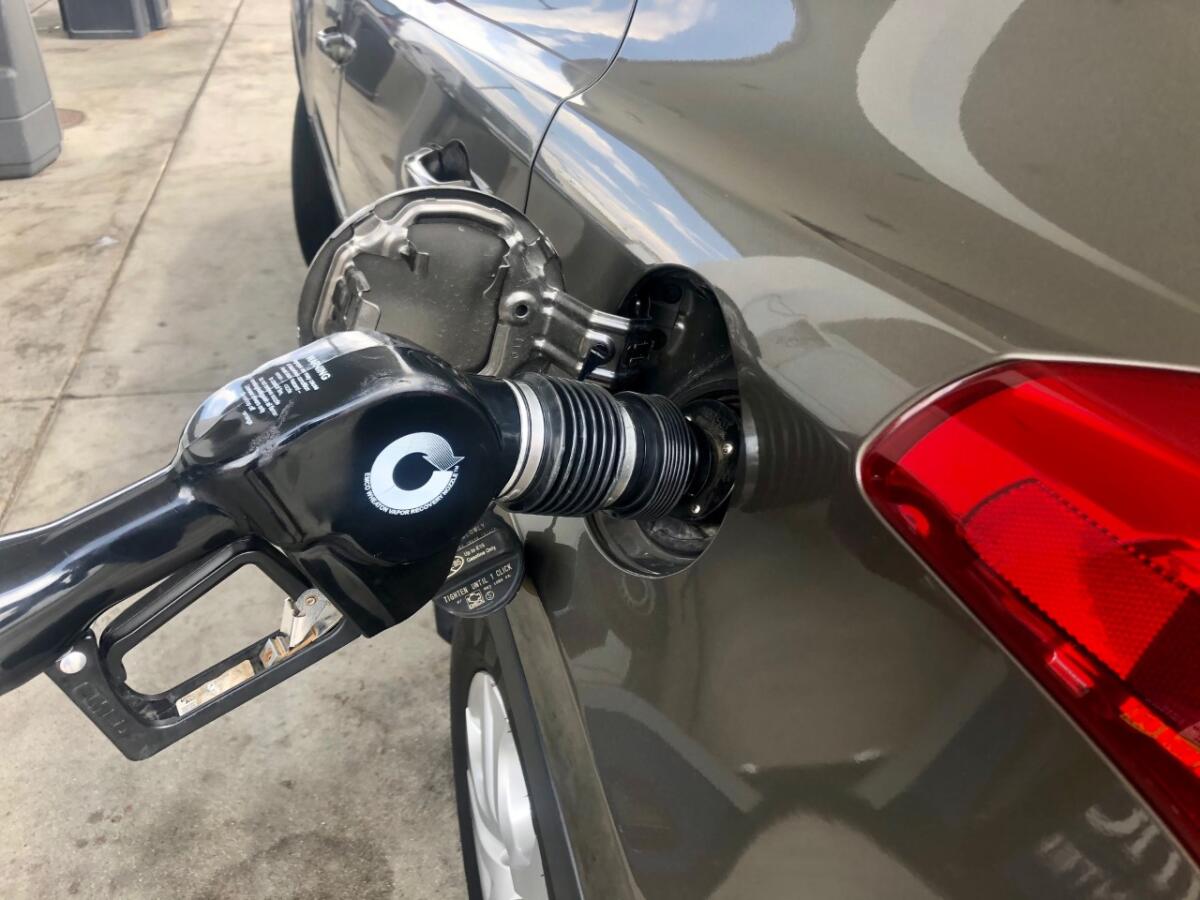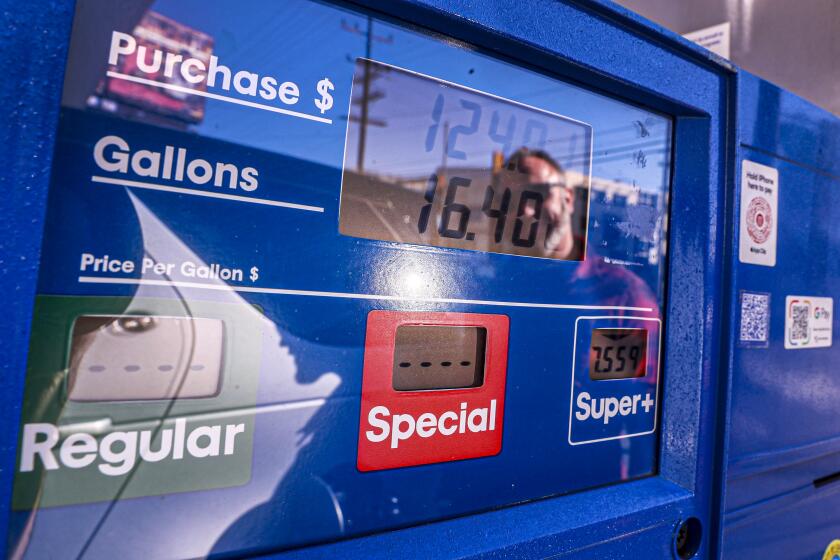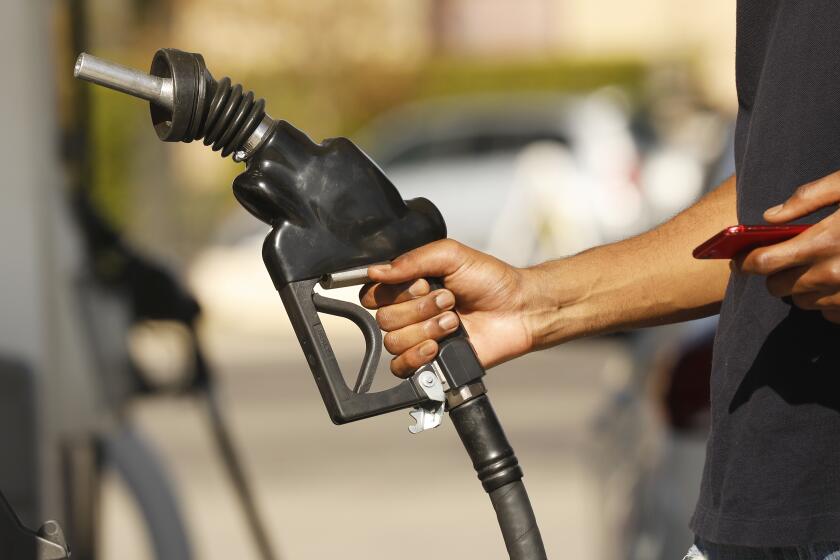Will a bill just passed in Sacramento solve the âmystery surchargeâ Californians pay at the gas pump?

Senate Bill 1322 mandates more information from the stateâs oil refiners
California oil refineries will be required to disclose more information about what goes into the pricing of gasoline that Golden State motorists pay at the pump under a bill that has passed through the Legislature in Sacramento and will soon land on Gov. Gavin Newsomâs desk.
Senate Bill 1322, sponsored by Sen. Ben Allen (D-Santa Monica), requires the stateâs five refiners to report to the California Energy Commission how much crude oil they refine into gasoline each month, how much they paid for each barrel and how much they make.
Supporters say the legislation will help explain whatâs been dubbed as a âmystery surchargeâ â an unexplained difference in price paid by California drivers when they fill up, even after all the federal and state taxes and fees are taken out of the equation.
âThe reason we believe that the gas prices are so high is because the oil refiners are charging us based on the world price of crude oil,â said Jamie Court, president of Consumer Watchdog, a Los Angeles-based consumer group that backed the bill. âBut their crude oil is much cheaper because they have long-term contracts for crude oil and theyâve basically exploited th0.e Ukrainian crisis just to make a killing.â
But Kevin Slagle, spokesman for the Western States Petroleum Assn., a trade group representing the regionâs oil companies and refineries, said the bill is unnecessary because the industry already submits âan excessive amount of dataâ to the energy commission on a monthly basis.
âThis is a solution looking for a problem,â Slagle said.
Gas prices seem to have little logic, especially since Russia invaded Ukraine. Culprits? A combination of market forces, the âmystery gas surchargeâ and more.
Itâs well known that California drivers pay more for a gallon of gas than those in just about any other state, largely due to higher taxes and fees, plus the cost of making the stateâs specially blended gasoline that is formulated to reduce air pollution.
The average price in California for a gallon of regular stood at $5.26 on Wednesday, according to the American Automobile Assn. Thatâs $1.42 higher than the average price in the U.S. of $3.84.
In February 2015, an explosion at an Exxon Mobil refinery in Torrance knocked out about 10% of the stateâs gasoline supply, driving up prices. After normal operations resumed, prices went down modestly. But research from UC Berkeley professor Severin Borenstein and others showed that prices did not completely return to their previous, pre-explosion, levels.
And for the last seven years, that residual amount â the mystery surcharge â has never gone away.
âThere continues to be a big black hole when it comes to data with relation to the oil and gas industry for how they price gas at the pump for regular Californians,â Allen said at a news conference earlier this year. âWeâre asking the oil companies on behalf of California drivers, letâs end the games of smoke and mirrors, open your books, show the public your true cost of doing business.â
In their most recent quarterly earnings reports, four of the five companies with refineries in California posted higher profits in the second quarter of this year than they did a year earlier. Chevron reported adjusted earnings of $11.6 billion, up from $3.1 billion in the second quarter of last year.
Gas prices in Los Angeles and Orange County have dropped to the lowest point since March.
âYes, the last few quarters have been healthy quarters for the energy industry across the country and thatâs due to demand,â Slagle said. âWhen you look during the COVID years when there was no demand, they lost $70 billion to $80 billion so thereâs really a cause and effect with demand, as much as anything.â
Court has accused the refineries of price gouging. âEven if they did take a bath at the beginning of the pandemic, theyâre making up for it now,â he said.
Borenstein of UC Berkeley estimates the unexplained differential that Californians pay at the pump currently comes to about 50 cents per gallon. But heâs not convinced SB 1322 will figure out exactly what is behind it.
âIf I had the data that theyâre asking for, I would certainly find them interesting and I would certainly be looking at them to see what I could glean from it,â Borenstein said. âI think [the bill] is a good start but weâre going to need a lot more information than it actually asks for.â
Borenstein suspects the problem does not lie with the refinery price but somewhere between the commodity price (the cost after the oil is processed into Californiaâs blended gasoline) and the retail price (the cost that consumers pay at the pump).
âWe donât have [the equivalent of] a Federal Trade Commission in California, and thatâs what you want,â Borenstein said. The FTC has âthe economists who have been studying the gasoline industry for decades and [who] really think about competition. No agency in California has that set of skills,â he said.
âI think this bill will yield some information but my guess is it will not yield enough information to really answer the question,â Borenstein added. âBut Iâm hopeful that it will keep the ball rolling.â
With gas prices soaring to record levels earlier this year, a select committee in Sacramento has been convened to look at gasoline supply and pricing. It is chaired by Assemblymember Jacqui Irwin (D-Thousand Oaks).
SB 1322 passed 22-4 on a Senate floor vote in May, moved through the Assembly floor, receiving a 42-23 vote Monday and was approved on a 30-9 vote through Senate concurrence Tuesday.
Asked whether Gov. Newsom will sign the bill into law, a spokesperson from the governorâs office said Wednesday morning, âwe have not commented on this one.â
More to Read
Inside the business of entertainment
The Wide Shot brings you news, analysis and insights on everything from streaming wars to production â and what it all means for the future.
You may occasionally receive promotional content from the Los Angeles Times.













